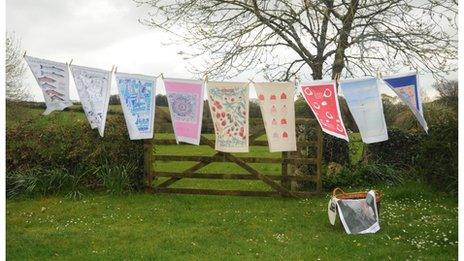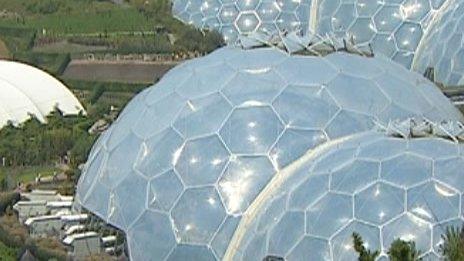How much is the Eden Project worth to the economy?
- Published

Sales of organic tea towels from Lorna Wiles have been given a lift by Eden
<bold>A row has erupted over a £1.8m loan to the Eden Project which was paid out of public money.</bold>
<bold>The debt, which was paid by the now defunct South West Regional Development Agency (RDA) in 2008, has raised the question over how much public money the tourist attraction gets and how much it is worth to the local economy.</bold>
John Sinkins is a busy man as a partner in Lostwithiel-based textiles printing firm Lorna Wiles.
But he admits that he would be less busy if not for the Eden Project, a major buyer of its products.
The firm started supplying organically-produced tea towels more than five years ago and has now added deck chairs, oven gloves and aprons to the list.
"We're really pleased to be working with Eden," he said.
"Without their orders we would not have had the confidence to invest in organic raw materials for our tea towels and that's opened up a whole new global market for us."
The tea towels are certified as organic by the Soil Association and the link with the Eden Project has resulted in Lorna Wiles products being stocked in Marks and Spencer and John Lewis.

The Eden Project delivered very good value for money for a project of its type, according to an independent report in 2009
It is a long way from 2001 when the Eden Project was launched and invited local firms to do business with it.
Now Eden spends more than £12m every year on products and services, many of which are supplied by businesses based in Cornwall and the South West.
A total of 101 companies have been chosen as key suppliers for "providing a high level of service and quality, and a commitment to waste efficiency and maximising sustainable practise".
'Sense of pride'
More than 50% of its supplies by value in 2009 were from within Cornwall, according to <link> <caption>an independent report for the South West Regional Development Agency</caption> <url href="http://economy.swo.org.uk/easysiteweb/getresource.axd?assetid=51431&type=0&servicetype=1" platform="highweb"/> </link> .
Other firms that supply Eden include Sharp's Brewery at Rock, Cornish Orchards at Liskeard and bulb supplier Fentogallon near Truro.
Andy Atkinson, of Cornish Orchards, said the Eden Project, along with other attractions such as the Lost Gardens of Heligan and restaurants such as Rick Stein's, had helped create a Cornwall "brand".
He said: "Eden has been good for the county as a whole. It does not matter whether you supply them or not."
Eden received more than £132m from 2001-2009 - £48.5m from the public sector and £56.4m from the Millennium Commission.
But the report said that as well as attracting 10 million visitors from 2001 to 2009, more than 40% of visitors to Cornwall said that the Eden Project had influenced their decision.
The report also said that the substantial number of staff - 420 in 2009 - and all the economic benefits combined meant that it had brought in an estimated £805m into the local economy over the six-and-a-half years leading up to 2009.
'Good bet'
It also said there were other benefits to the local area through its support of communities, schools and other groups.
It said: "The Eden Project has generated a sense of pride and an increase in the collective self-esteem as well as increased community cohesion."
The report concluded that overall, Eden had "delivered very good value for money for a project of its type".
Eden founder, Tim Smit, said the number of visitors to the attraction was rising.
"We are on the up. We have 467 staff. We are in the top 20 employers in the South West," he said.
"I would say that Cornwall, the RDA and Europe made a pretty good bet in betting on us."
- Published28 May 2012
- Published28 February 2012
- Published28 February 2012
- Published22 September 2011
- Published17 March 2011